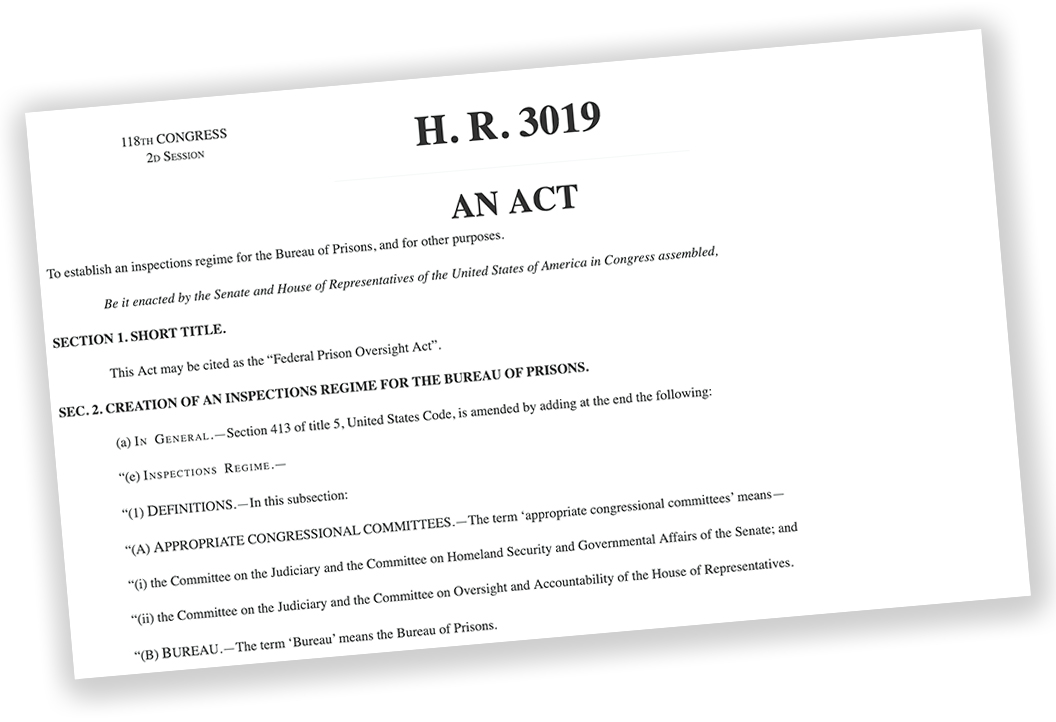We post news and comment on federal criminal justice issues, focused primarily on trial and post-conviction matters, legislative initiatives, and sentencing issues.

PATTERN AIN’T PERFECT, BUT IT’S GOOD ENOUGH
 The National Institute of Justice released its 2023 Review and Revalidation of the First Step Act Risk Assessment Tool last week, suggesting that while there remains fine-tuning to be done, no one should expect any changes in how PATTERN is scored or, for that matter, calculated in next year or two.
The National Institute of Justice released its 2023 Review and Revalidation of the First Step Act Risk Assessment Tool last week, suggesting that while there remains fine-tuning to be done, no one should expect any changes in how PATTERN is scored or, for that matter, calculated in next year or two.
NIJ said that the PATTERN recidivism risk tool
remains a strong and valid predictor of general and violent recidivism at the one-, two-, and three-year follow-up periods,” measuring changes in PATTERN scores. The study concluded that “comparisons of recidivism rates by risk level category (RLC) and predictive value analyses by risk level grouping also continue to indicate that such risk level designations provide meaningful distinctions of recidivism risk.
The PATTERN scoring matrix assigns points to prisoner age: the older the prisoner, the lower the points. Lower points lead to lower risk categories. Like golf, the lower the score, the better.
 NIJ conceded that while substantial criticism exists that rigid age brackets make it hard for prisoners to make meaningful changes in PATTERN risk categories, “individuals can change their risk scores and levels during confinement beyond mere age effects. Those who reduced their RLC from first to last assessment were shown to have the lowest recidivism rates, followed by those who maintained the same risk level and those with a higher risk level, respectively.”
NIJ conceded that while substantial criticism exists that rigid age brackets make it hard for prisoners to make meaningful changes in PATTERN risk categories, “individuals can change their risk scores and levels during confinement beyond mere age effects. Those who reduced their RLC from first to last assessment were shown to have the lowest recidivism rates, followed by those who maintained the same risk level and those with a higher risk level, respectively.”
Likewise, it conceded that “there remains evidence that [PATTERN] predicts differently across [racial] groups, including overprediction of risk of Black, Hispanic, and Asian males and females, relative to White individuals, on the general recidivism tools.”
Writing in Forbes, Walter Pavlo noted that the NIJ study “confirmed that those with minimum PATTERN scores had a recidivism rate after 3 years of 9.2% for men and 7.4% for women. According to the Government Accountability Office, the overall recidivism average for all prisoners released from BOP is 45%, with men with high PATTERN scores having a recidivism rate of 77.5%, according to GAO. That data shows one of the complicated issues about the First Step Act… those who really need to program to turn their lives around have no incentive to participate in needed programming.”
Pavlo wrote that currently, First Step forces the Bureau of Prisons to “spend hundreds of millions of dollars in programming on those prisoners who are less likely to return to prison anyway. Make no mistake, PATTERN is proving to be a good measure of future success or failure after prison. However, most prisoners in the federal system are going to return to society at some point, dollars may be better spent on a population that needs the programming.”
Pavlo also noted last week in another post that the BOP’s Office of Public Affairs recently reported that the average cost of housing minimum security prisoners “approaches the average cost of housing someone at a US penitentiary.”
 “Of the BOP’s nearly 160,000 prisoners,” Pavlo wrote, “24,000 of them are minimum security. The BOP’s statement was that the average cost of housing a minimum security prisoner in 2024 is $151.02. The cost of housing someone in a US penitentiary is $164.87 (Lows were $129.72 and Mediums are $122.50). Since there are more minimum security prisoners than high, the total costs of housing minimum security prisoners far exceeds the costs of housing those in high security….”
“Of the BOP’s nearly 160,000 prisoners,” Pavlo wrote, “24,000 of them are minimum security. The BOP’s statement was that the average cost of housing a minimum security prisoner in 2024 is $151.02. The cost of housing someone in a US penitentiary is $164.87 (Lows were $129.72 and Mediums are $122.50). Since there are more minimum security prisoners than high, the total costs of housing minimum security prisoners far exceeds the costs of housing those in high security….”
NIJ, 2023 Review and Revalidation of the First Step Act Risk Assessment Tool (August 25, 2024)
Forbes, Bureau of Prisons PATTERN Score Reveals Lower Recidivism For Campers (August 27, 2024)
Forbes, The High Price of Minimum Security Federal Prisoners (August 25, 2024)
– Thomas L. Root
























